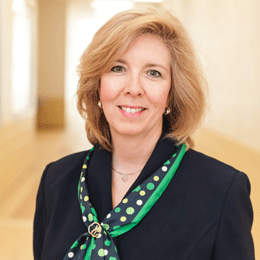
Genevieve Marino never planned on a nonprofit career. Assuming the role of Chief Executive Officer of the Girl Scouts of Central and Southern New Jersey has given her the opportunity to make an impact on young women at an early age. What she didn’t expect was just how much it would impact her personally.
The Girls Scouts of Cenral and Southern New Jersey’s (GSCSNJ) selected Genevieve (Gin-ny) B. Marino as Chief Executive Officer three years ago. Now, after 12 years working with dis-advantaged adults at YWCA Delaware, she considers herself lucky to provide opportunities for girls that may just prevent them from ending up in that situation.
On nonprofit work…
I’ve been involved in nonprofit and community work most of my adult life. Prior to work-ing in the sector, I was very involved in a lot of organizations as a volunteer. Finding meaning and purpose in my work is really important. And I learned soon after taking my first job at the YWCA that what I really care very deeply about—and am very personally passionate about—is the advancement and empowerment of women and girls. So, I look at my nonprofit career as having two parts. The first part, I spent helping women come back from and overcome life cir-cumstances and situations where they weren’t able to provide for themselves or their families economically or socially. Now, I feel like I have a tremendous opportunity to start from the be-ginning, helping to build girls who have the courage, confidence and character so that they don’t find themselves in the situations that the adults I worked with were in. I’m really excited to be on the prevention side at a place that is doing that for girls.
On moving from the private sector…
I consider myself very lucky because I found my pond by accident. My last job prior to coming into the nonprofit sector was in the banking industry. I was a merchant victim. The bank I worked for was being acquired and I needed to do something different. So, I took another job back in the IT industry and really during the next year, I knew the work I was doing didn’t have meaning. I really started looking for another banking job that had a community relations or mar-keting or volunteer connection with an organization that had social purpose. I found the role at the YWCA by networking. I wasn’t really aware of what they stood for or did. Once I joined the team, I was able to find and clarify my personal passion for these kinds of things.
I’m big believer in that saying that when one door closes, another one opens. I know now that I probably learned to have the courage to step through that door when I was a Girl Scout. One of the things we teach our girls is to be courageous and step outside their comfort zone, speak up, be direct in their communication and in their actions. I never actually connected it before working with the Girl Scouts.
I think that one of things we’ve identified as an organization—not only here in South Jersey, but also nationally as a Girl Scout movement—is that we really need to be clear and to focus on reestablishing our relevancy. Girls do have options today with lots of different activities that we couldn’t even have imagined when we were growing up. So, the choices they have are tremen-dous. So, the choices they have are tremendous. And it is a little more challenging for us to really get people to look beyond what they think about Girl Scouts and look at who we are and the dif-ference we’re making in the lives of girls.
So, once girls join us and become part of the organization, they find many of the same benefits that have been evergreen. For today’s girls, there are a few things we provide that are still uniquely associated with Girl Scouting. One is the opportunity to take risks in a comfortable, safe space, whether that be going away to camp for the first time or trying a new activity they have been afraid of. Certainly on sports teams, they learn teamwork, a balance between winning and losing, how to rebound. ... But what about the girl who is on the basketball team, but never gets to play? Where is the opportunity for her to put herself out there and individually develop that sense of resilience? Girl Scouts is a place where she can do that. She needs a place where she can do things on her own as well.
On modern Girl Scouting…
One of the main things we are focusing on is adapting the program to include, embrace and be centered around technology. We know kids today are digital natives, technology is a part of their way of living so it’s important that we figure out how to best use technology as a means to an end. One example, through the Girl Scout cookie program, we teach financial literacy and business skills. We now have a technological component where girls can build and design mini-internet businesses, through which they can market and sell the cookies. That’s something that provides a whole different level of learning that’s in many cases more intriguing to the girls.
Another area we are very focused on for a variety of reasons is encouraging girls to stick with their interests in STEM-related fields. The unfortunate statistics are that girls are highly likely during middle school years to step out of science or math courses because the stigma of appear-ing smarter than boys is still part of their peer culture. Just recently, one of our high school girls who is very involved in robotics shared with us that, if not for her Girl Scout troop, she probably wouldn’t do it as an individual because it’s not cool for a girl to do that at her school. No child wants to feel like an outsider. They are still battling peer pressure issues as they are going through those formative years.
Those special moments…
I think as the official CEO of the organization, the thing I am most proud of is that we have a strategic vision for the future of our organization. I spent most of my first two years here listening and gathering input from all of our constituents and the community at large and build-ing momentum around a vision for the future. We have that now. It’s evolving and it will be adaptive as we go forward. We’ve galvanized ourselves behind that.
But it’s lots of little moments where I get to talk with these young women and hear their stories and find out what Girl Scouting really means to them and what it’s done for them and their fami-lies. The girl who has probably made the greatest impact on me was being bullied in her elemen-tary school. She never told her parents, didn’t say anything to anyone and went to school every day and just trudged through. She got to the fifth grade and decided she had enough, but [also that] she was going to change the world for everyone else. She founded an anti-bullying initiative at her elementary and middle schools. To see this young girl stand up in front of all those people and talk about why this awareness day was happening, why she founded it and the difference she hoped it would make ... that is the best part of my job. To know that our organization, the caring troop leaders and other volunteers that surrounded her were part of what built that within her is extraordinary.
Looking toward the future…
We really believe and know that even two years of a Girl Scout experience of some kind really can imprint on a girl and make a huge difference in all the rest of her life’s journey. It’s really my goal to get the word out as much as possible, to tell our story so that parents see us a viable option for their daughters and that we can do more. I’m a believer and a living example as our countless other women in are community of how Girl Scouting can make a difference.
Published (and copyrighted) in South Jersey Magazine, Volume 13, Issue 14 (July, 2016).
For more info on South Jersey Magazine, click here.
To subscribe to South Jersey Magazine, click here.
To advertise in South Jersey Magazine, click here.












